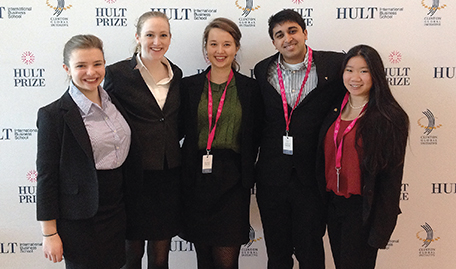Late at night, wandering around the Web, Ajay Palekar ’17 stumbled upon a site that made him pause. It put forth a challenge. A big one. An entrepreneurial competition was looking for teams of college students to take on a global problem affecting millions of people. At stake was a $1 million prize. “This seems interesting,” Palekar thought.
He immediately went to some campus friends and asked if they would like to enter. “Everyone said yes instantly,” he says. With the application deadline a mere three days away, they hustled to submit the required materials. Then, just a few weeks later, they were invited to participate.

Photo courtesy Karoline Aaen ’17
Emily Rochford (from left), Alyssa Reisner, Karoline Aaen, Ajay Palekar, and Emily Jones, all ’17
And that’s how Palekar, Karoline Aaen, Emily Jones, Alyssa Reisner, and Emily Rochford, all Class of 2017, became involved with the Hult Prize. The competition’s mission is to encourage social entrepreneurship, and the Babson first-years were one of about 300 student teams from around the world picked to compete this year.
The Beavers were chosen from the more than 10,000 applicants in large part due to the strength of their backgrounds. Among other accomplishments, they are veterans of previous case competitions (Palekar, Rochford, and Jones competed together last year in a PricewaterhouseCoopers contest and won). They also have international experience. In high school, for instance, Jones participated in a business leadership program that sent her to Poland. Aaen, meanwhile, was raised in China, where she was involved with efforts to rebuild a school damaged by an earthquake.
For the Hult Prize, all the selected teams addressed a challenge laid out by former President Bill Clinton, whose Clinton Global Initiative is a partner in the competition. His challenge: Propose a social enterprise that can improve the care of chronic diseases in slums. According to data from the Hult Prize, more than 250 million people living in poor urban areas need help for their chronic conditions.
At first, says Aaen, the problem seemed too daunting. “It is overwhelming, so different from what we normally think about,” she says. “But then we thought about how to break it down.” The first-years needed to do research—about slums, about health care, about all kinds of related topics. They searched the databases in the Horn Library, and they reached out to The Arthur M. Blank Center for Entrepreneurship and The Lewis Institute, both of which connected the students with contacts in the health-care field. They also went to the Speech Center for help with their presentation.
After all their research, the team members hammered out a proposal that involved training locals as health advocates, who in turn would help enroll households in a community-based, micro-insurance plan. “For a small but regular premium, members would have access to diagnostics for chronic illnesses and to medication for treatment,” Palekar says. With their idea ready, the team headed to the regional finals in March. Forty-four teams gathered in Boston, and only one would move on to the final round in September.
The competition was stiff. The Babson team was one of only two made up of undergraduates. The rest were full of graduate students. “You can imagine that we felt a bit intimidated,” Palekar says. “To add to this, our judges were all extremely impressive. They were CEOs, government officials, and experts in their fields.” Ultimately, a team that proposed a healthy chewing gum to prevent tooth decay won the chance to fine-tune its proposal this summer in an accelerator with other winners before competing in the finals.
Outside of some initial jitters, though, the Babson team felt invigorated by the competition and looks forward to entering again next year. Besides, winning or losing isn’t the main purpose of the Hult Prize, they say. The contest is about pushing oneself and figuring out ways to help people in need. “It challenged us to think about a field of study that most business students never encounter,” Palekar says.—John Crawford
